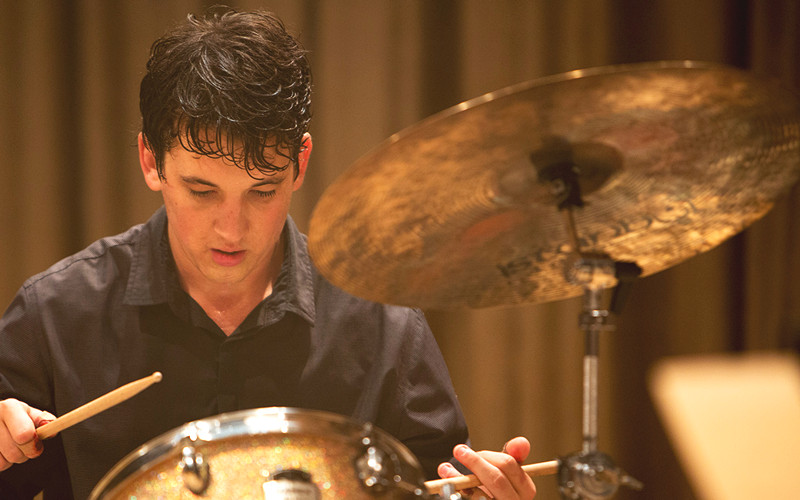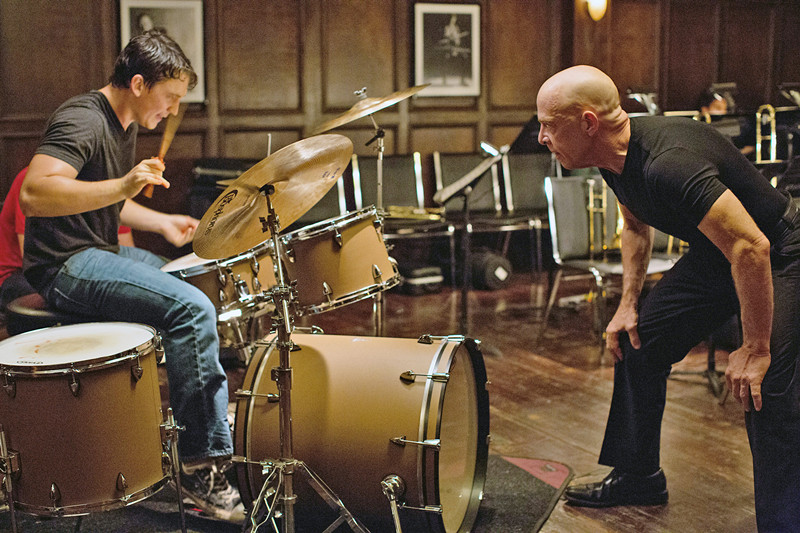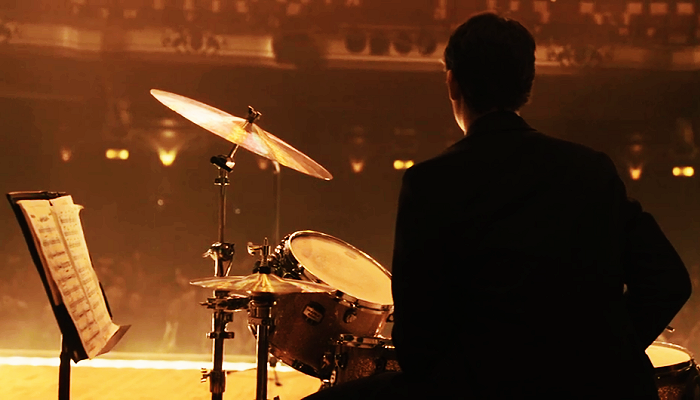
Warning: This article may contain spoilers.
Furious. Visceral. Insane. These are only some of the many ways to describe Damien Chazelle’s 2014 tour de force, Whiplash. The masterpiece centers on a young music student, Andrew Neiman, played by Miles Teller. While attending the highly prestigious Shaffer Conservatory, he endures heavy competition, internal pressures, and an insane bandleader who pushes him over the edge. J.K. Simmons, of course, plays the seasoned, yet brutal, bandleader, Terence Fletcher.
Told with only two main characters, Chazelle brought his raw, and powerful screenplay to life to create one of the greatest films of the 21st Century. Brilliant performances, bold directing, and everything in between culminate in an experience that garners only one feeling: Pure Cinema. Whiplash is considered a great film, but listed below are four reasons why it is a modern classic.
1. Career-Making Performances

Before Whiplash, J.K. Simmons was more or less a character actor, never fully reaching his dramatic potential. After his performance in Whiplash, he received his first Academy Award for Best Supporting Actor. While Miles Teller still has yet to receive or be nominated for an Oscar, it is undeniable that Whiplash put him on the mainstream commercial map.
The soul, identity, and embodiment of Whiplash can be found in its standout performances. Andrew’s initial submission and later rage, Fletcher’s intense public berating of Andrew, and the climactic ending in which they are both finally equals, stick in the audiences psyche long after viewing.
The contrast between Fletcher’s tight, black clothes and bald, white head are metaphoric of his soul; dark, menacing, and forceful. In some scenes, he and Andrew both wear black, suggesting their motives and core identities are similar. They both want to be great, and are willing to sacrifice anything and everything along the way to achieve greatness, whether it be love, time, or happiness. Teller’s youthful eagerness and Simmons’ seasoned and precise anger blend to create something powerful and unique.
It’s arguable that if Miles Teller and J.K. Simmons were not cast, Whiplash would not be the masterpiece that it is today. While Chazelle’s film would have been good either way, their performances are the identity of the movie. On The Waterfront and The Silence of the Lambs come to mind as comparisons as to what the leads contribute to the picture. Just imagine Jack Nicholson not starring in One Flew Over The Cuckoo’s Nest and you’re on your way to seeing the argument here.
2. Parallels To Other Classics

Whiplash shares many connections to other classics, in almost all of the major categories that contribute to an outstanding film. The editing is rhythmic, the cinematography is lonely and harsh, the score is like jazz itself; stagnant, yet smooth. The directing is complex, and the writing is brutal and to the point. Like most classics, Whiplash simply does it all, and it does it all very well. Even the ending leaves little to be desired, or say, except “wow”. Damien Chazelle literally leaves the audience sounding like Owen Wilson.
In many classics, we are presented with two opposes forces, Luke Skywalker vs. Darth Vader, Antonio Salieri vs. Wolfgang Amadeus Mozart, George Bailey vs. Mr. Potter, Daniel Plainview vs. Eli Sunday, and Dorothy vs. The Wicked Witch of the West, to name a few examples. Whiplash arguably stands among those duos as one of the greatest character driven films of all time.
Neither of the main characters is inherently good, despite what it may appear to be like. Miles Teller’s Andrew Neiman breaks his girlfriend’s heart so he can focus on himself and his career without her stopping him. J.K. Simmons’ brutal Terence Fletcher methodically abuses his students both mentally and physically.
Perhaps the personal battles aren’t the point of the film. Maybe the point is that there is no inherent goodness, no one is good or bad, but we are all mere beings. Imperfect, yet redeemable souls.
Chazelle suggests this by showing us the characters at their worst, and at their best. Andrew charms a movie theater clerk into a date with him. Fletcher admits to Andrew that the only reason he pushed him over the edge was so that he could experience greatness. By doing this, he powerfully lets the viewer decide for himself or herself what to think of the character, without spelling it out for anyone.
Lastly, like all classics, its re-watch ability is terrific. Magnificently, the film never gets old. The drumming scenes are just as intense and gripping as they were at its premiere, the performances are as raw as ever, and its pace assures Whiplash to be increasingly entertaining with every viewing.
3. Structure

Simply put, Whiplash is a clean film. It’s bare, while not lacking drama and complexity. The mise en scene is stark and simple. The music scenes are lit with almost a gold-like tint, reminiscent of the drumming cymbals themselves, yet not distracting from the action. The flow is frantic, yet smooth, like jazz itself. Scenes of lighthearted dialogue are followed by moments of intense action, often times at Andrew’s expense.
Whiplash successfully does what few films can accomplish; it makes a film powerful and interesting with two main characters. There are no scenes that make you ask yourself, “Why is that in there?” Or “What was the point of that?” There’s nothing more annoying and revealing of a bad film then having those types of questions associated with it. Take the four-minute sex scene in The Room, for example. Nobody wanted to see your gluteus, Tommy Wiseau.
In addition to having only a 106-minute run time, plot holes are difficult to find, as the story is rather straightforward. It all mends together to create a smooth, yet stagnant euphoria that only cinema, drumming, and Damien Chazelle could create.
4. The Ending

The ending brings together the fantastic writing, characters, mise en scene, and performances in the most grandiose, brutal, and epic way possible. It’s triumphant, yet costly, splendorous, and yet heartbreaking. Andrew achieves a sense of temporary success, but at the cost of his humanity and love for the craft. Neither Fletcher, nor Andrew necessarily win. Rather, for a brief moment, they are equals.
After Andrew attacks Fletcher and gets suspended from Schafer, he anonymously testifies against his former bandleader about his brutal teachings and turns his back on drumming. In the following months, he gets a job at a restaurant and begins applying to other colleges. One night, he walks past a jazz club and stumbles upon Fletcher playing a delicate piano piece.
After Fletcher’s performance, Andrew approaches him. They share a long conversation in which Fletcher confesses that he meant no harm by his aggressive methods, he simply wanted to push his students towards greatness and believed if he were not as brutal, that they would not experience great success. He later invites Andrew to play the drums for his new band, an invitation that Andrew accepts. Practices go well and soon enough they prepare for their first competition.
Minutes before the competition, the mood is light. Any animosity or bitterness seems to have passed them. Fletcher even gives Andrew a wink before they head on stage, assuring Andrew that he does in fact want him to succeed.
As they arrive on stage, Andrew orders his sheet music. Fletcher approaches him and says, “I know it was you”. Within seconds, he signals the band to play a different song then the one they rehearsed with Andrew; one that he knows not how to play. As the song begins, Andrew tries to keep up, but fails and eventually sits behind the drum set, defeated. Fletcher approaches him and says, “I guess you don’t have it”. Andrew quickly abandons the stage and runs to his father in the lobby, sobbing.
Andre’s father tries to convince him to leave the building and forget about the experience, but his son is determined to not let Fletcher win. He musters any courage he has and approaches the drum set once more, knowing that it may be his last professional performance. No critic or bandleader in the audience would hire him again after his meltdown, and he knows this fact. But it doesn’t matter. He must beat fletcher.
Andrew sits behind the set with a new confidence and stares Fletcher down as he starts playing a different song. Fletcher is furious. Andrew cues the band in and they play a new song, which ends in a drum solo, proving that he is in fact a great drummer. They share a moment of euphoria, as Fletcher’s initial rage seems to be overtaken by a sense of pride.
Andrew is his product. In trying to prove Fletcher wrong by returning to the stage, he has unintentionally submitted to Fletcher’s will and teachings. A single tear of joy falls from Fletcher’s face as he they are equals, or so it seems.
End of movie
The raw power of this scene will shake any conscious audience member to their core. It ends on such a high emotional note. Rather than have everything come to a smooth conclusion in which the “good guy” or “bad guy” wins, it simply shows us what happens without bias or particularity. Because of this, Whiplash arguably features the greatest ending of any film this past decade.
What does this all mean? Does Andrew ever drum professionally again? Is Fletcher’s band leading career over? Is this the last time the two characters ever meet? Chazelle never answers these questions, but perhaps that’s how it should be. Like any great piece of art, the ending of Whiplash is open to interpretation. Maybe that’s the lesson to be learned here.
After all, life itself is full of ambiguity. Nothing truly makes sense. However, we find meaning nonetheless, whether it be in love, professions, or a god. Regardless of the ending’s meaning, Whiplash will be forever remembered as a classic. Either as a foretelling of Chazelle’s career, the high note of J.K. Simmons’ theatrical abilities, a great example of a film with a simple yet effective structure, or it’s parallels to other classics.
Author Bio: Kyle Bagdonas is an aspiring Writer/Director currently enrolled in Film School. As far back as he can remember, he’s wanted to be a filmmaker and hopes to experience great success in his artistic endevours. You can find his original content on YouTube by simply searching his name.